Danyliw Research Seminar on Contemporary Ukraine
26-28 September 2024
Chair of Ukrainian Studies, University of Ottawa
danyliwseminar.com
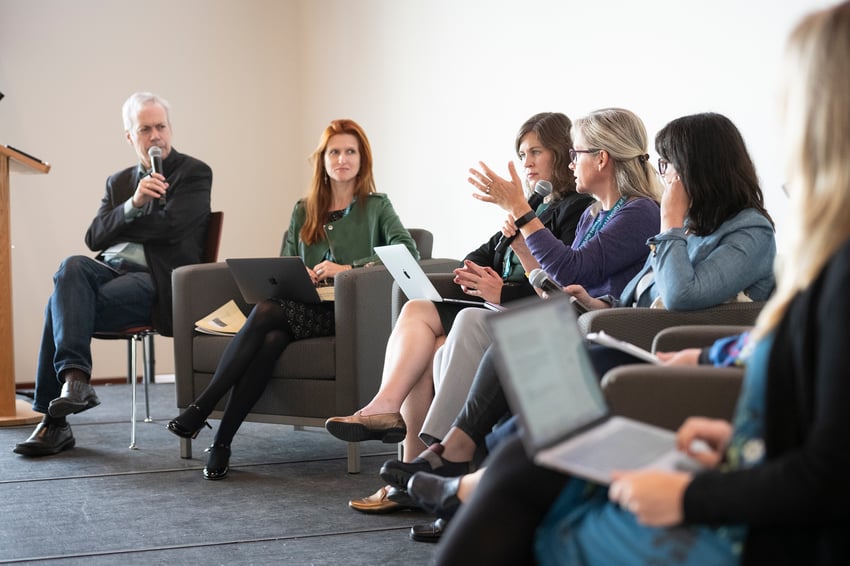
Photo: Melanie Provencher
After two successful post-pandemic seminars in 2022-23, the Danyliw Research Seminar on Contemporary Ukraine was back on 26-28 September 2024. The Seminar is hosted by the Chair of Ukrainian Studies at the University of Ottawa with the support of the Danyliw Foundation in Toronto.
Since 2005, the Danyliw Seminar has provided an annual platform for the presentation of some of the most influential academic research on Ukraine — from scholars, including doctoral students, based in Ukraine, the rest of Europe, the United States, Canada, or anywhere in the world.
The 18th Annual Danyliw Seminar was held from September 26 to 28, 2024
More than 2 ½ years into a devastating war, the Danyliw Foundation and the Chair of Ukrainian Studies at the University of Ottawa organized the 18th Annual Danyliw Seminar on Ukraine at War. The three-day event (September 26-28) brought together 30 international guests, more than half from Ukraine. The seminar is the largest in-person academic conference on Ukraine in the world.
Topics addressed in presentations ranged from civilians and warfare, refugees, occupied territories, language and national identity, the World War II Galicia Division, oligarchs and corruption, gender and war, media, decolonizing Ukrainian studies, and the war in cinema.
The program is available at https://www.danyliwseminar.com/program-24
The seminar profiled two new books on the war – by Serhiy Kudelia (Seize the City, Undo the State: The Inception of Russia’s War on Ukraine) and Marta Dyczok (Ukraine not “the” Ukraine)
Presentations, discussion sessions and articles are available on the seminar website and our YouTube channel. You can also follow us on Twitter/X. 
Latest and Upcoming Events
Other Events
Academic Conferences
- The Annual Danyliw Research Seminar on Contemporary Ukraine is the Chair's marquee annual event and is dedicated to provide a unique forum for researchers from Canada, Ukraine and elsewhere open to all social science and humanities research topics touching on Ukraine. The Seminar is made possible by the commitment of the Wolodymyr George Danyliw Foundation.
- Since 2009, the Annual International Social Science School in Ukraine is held for an intensive week in early July with an international group of doctoral students and faculty members converging to a specific town in Ukraine to hear and discuss presentations on ongoing research on a critical theme.
- Since the beginning of the unfolding events in Ukraine related to Euromaidan in November 2013 and its aftermaths, the Chair has sought to raise critical awareness and encourage ongoing debates on the current situation in Ukraine through different roundtables and public lectures.
Community Activities
- Since 1985, the Ivan Franko Memorial Annual Lecture, co-sponsored by the Ottawa chapter of the Ukrainian Canadian Professional and Business Association (UCPBA), has helped to raise the profile of Ukrainian studies, and raise awareness of Ukrainian matters in Canada's capital by bringing high-profile scholars to discuss topics of importance for contemporary Ukraine.
Maidan Lectures
by Dominique Arel
L'insurrection du Donbas, presented at the event L'Ukraine à la veille de l'élection présidentielle du 25 mai 2014, CERI, SciencesPo, Paris (France), 14 May 2014.
"Categorizing to de-Legitimate," presented at the roundtable Euromaidan, the Fall of Yanukovych and Russian Intervention, ASN World Convention, Columbia University, New York (US), 24 April 2014.
"On Political Violence in Ukraine," presented at the roundtable Ukraine: Origins of the Current Crisis, New School University, New York (US), 23 April 2014.
"Ukraine at the Crossroads of Survival as a Political Community", presented at the roundtable Defining Ukraine: Domestic Politics in the Shadow of a Catastrophe, Watson Institute for International Studies, Brown University (US), 17 April 2014.
"Le plan russe de casser l'Ukraine", présenté à la table-ronde Après l'annexion de la Crimée par la Russie, quel avenir pour l'Ukraine et l'ordre international européen?, Université du Québec à Montréal (UQAM), 10 avril 2014.
"Double Talk: Why Ukrainians Fight Over Language," published on the web site of Foreign Affairs, 19 March 2014. The text can be accessed here.
"Russia Cannot Accept Ukrainian Defiance", presented at the roundtable The Ukraine Crisis: What Next?, Center for International Policy Studies (CIPS), University of Ottawa, 18 March 2014.
"Is Ukraine an Autonomous Actor?" presented at the roundtable Ukraine Under Russian Threat, Chair of Ukrainian Studies, University of Ottawa, 12 March 2014.
"The Memory War," presented at the workshop From Memory to Mending: Lessons from Eastern Europe from Germany's Foreign Policy of Reconciliation, Kennan Institute, Washington, DC (US), 6 March 2014.
"About Those 'Fascists' in Kyiv…", published in Transitions Online, 7 March 2014. Originally presented as "The Battle of Legitimacy" at the Standing Committee on Foreign Affairs of the House of Commons, Ottawa, 3 March 2014, and at the roundtable Crisis and Invasion in Ukraine, Institute of European, Russian, and Eurasian Studies (EURUS), Carleton University, 4 March 2014.
"The Fall of a Regime", posted on The Ukraine List (No. 467), 28 February 2014.
"The Radicalization of Ukrainian Politics", presented at the roundtable The Rebellion in Ukraine: Alternative Views, Chair of Ukrainian Studies, University of Ottawa, 26 February 2014.
"Crossing the Line in Ukraine", presented at the roundtable Why Ukraine Matters?, McGill University, 19 February 2014.
"The Ukrainian Rebellion", presented at the roundtable Ukraine On The Rise, Chair of Ukrainian Studies, 29 January 2014.
Ukraine Summer School
Borders in the Post-Socialist Space: Past, Present, Future
Sponsored by the Danyliw Foundation
The Embassy of France in Ukraine inaugurated in 2009 the Annual International Social Science School in Ukraine. For an intensive week in early July, an international group of twenty doctoral students and up to a dozen faculties are converging to a different town in Ukraine to hear and discuss presentations on ongoing research on a critical theme.
The Summer School is designed to be interdisciplinary and international and follows the format of a Workshop. The program also includes lectures and field trips, of historical and contemporary significance, within the region.
The first five Schools were held in
:
- Uman, July 2009 (Studying Memories of Central Europe)
- Dnipropetrovsk, July 2010 (Approaches to Post-Soviet Transformation)
- Ostroh, July 2011 (Soviet Legacies, Post-Soviet Practices: Politics, Economy, Everyday Life)
- Zhytomyr, July 2012 (Violence and Its Aftermath in the Soviet and Post-Soviet Context)
- Mykolaiv, July 2013 (Challenging the Social Order: Revolution, Reform and Transformation Under and After Socialism)
- Lviv, July 2014 (Embracing the City)
The 7th Annual School, to be held in Chernivtsi, Western Ukraine, on 3-9 July 2015, will be devoted to the theme “Borders in the Post-Socialist Space: Past, Present, Future”.
In 2010, the Chair of Ukrainian Studies became a co-sponsor of the School, in partnership with the Doctoral School of the University Kyiv-Mohyla Academy and the École des Hautes Études en Sciences Sociales [EHESS] in Paris. The 2014 School, for the first time, was primarily funded by the Danyliw Foundation, a long-term partner of the Chair. The Danyliw Foundation will once again sponsor the 2015 School, in partnership with the French Embassy in Kyïv, French academic institutions and the Yuriy Fedkovych Chernivtsi National University.
The Organizing Committee includes Anna Colin Lebedev (EHESS), Dominique Arel (Chair of Ukrainian Studies), Mayhill Fowler (Stetson College, US), Sophie Lambroschini (EHESS), François-Xavier Nérard (U Paris Sorbonne), Amandine Regamey (U Paris Sorbonne), and Ioulia Shukan (U Paris Ouest Nanterre).
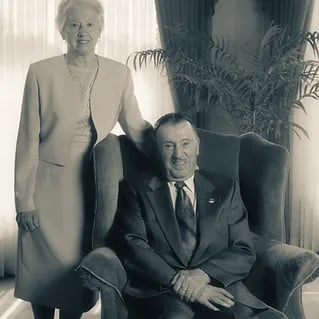
The Chair of Ukrainian Studies at the University of Ottawa, the only research unit outside of Ukraine predominantly devoted to the study of contemporary Ukraine, is announcing a new competition of the Drs. Peter and Doris Kule Doctoral Scholarships on Contemporary Ukraine. The Scholarships will consist of an annual award of $30,000, with all tuition waived, for four years (with the possibility of adding a fifth year).
The Scholarships were made possible by a generous donation of $500,000 by the Kule family, matched by the University of Ottawa. Drs. Peter and Doris Kule, from Edmonton, have endowed several chairs and research centres in Canada, and their exceptional contributions to education, predominantly in Ukrainian Studies, has recently been celebrated in the book Champions of Philanthrophy: Peter and Doris Kule and their Endowments.
Students with a primary interest in contemporary Ukraine applying to, or enrolled in, a doctoral program at the University of Ottawa in political science, sociology and anthropology, or in fields related with the research interests of the Chair of Ukrainian Studies, can apply for a Scholarship. The competition is open to international and Canadian students.
The application for the Kule Scholarship must include a 1000 word research proposal, two letters of recommendation (sent separately by the referees), and a CV to be emailed to Dominique Arel, Chair of Ukrainian Studies, at darel@uottawa.ca.
Applications will be considered only after the applicant has completed an application to the relevant doctoral program at the University of Ottawa. Consideration of applications will begin on 1 February 2024 and will continue until the award is announced.
The University of Ottawa is a bilingual university and applicants must have a certain oral and reading command of French. Specific requirements vary across departments.
Research Chair Holder:
Dominique Arel
darel@uottawa.ca
Dominique Arel holds the Chair of Ukrainian Studies at the University of Ottawa. He is the ASN Convention Director and the Danyliw Seminar Director. In 2023, he published Ukraine's Unnamed War: Before the Russian Invasion of 2022 (Cambridge University Press), co-written with Jesse Driscoll (UC San Diego).
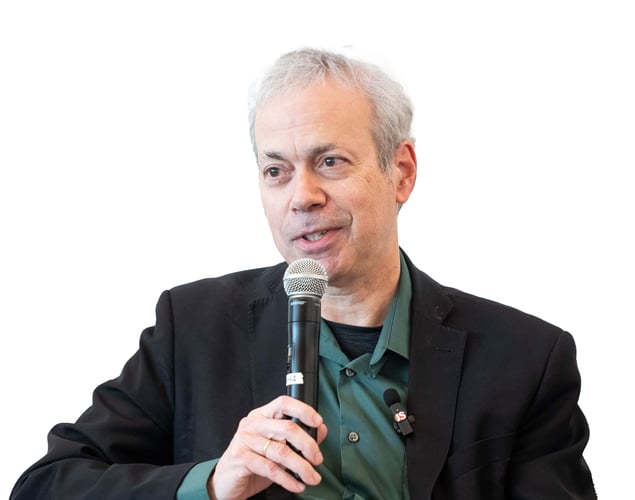
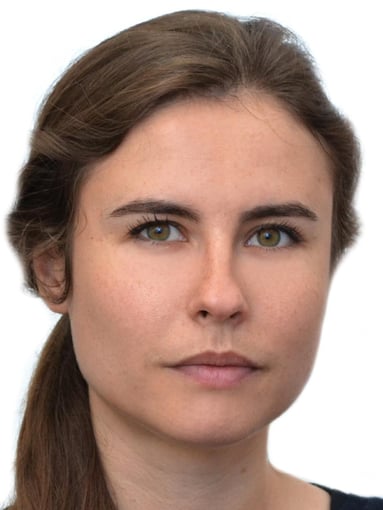 Anastasia Fomitchova
Anastasia Fomitchova
PhD, Ex-Kule Scholar
anastasia.fomitchova@gmail.com
Dr. Anastasia Fomitchova, born in Kyiv, completed a PhD in Political Science at the University of Ottawa. She received financial support from the European Research Council's project n°669690 and the Kule doctoral scholarship in Ukrainian Studies. Her main research area is the internal dynamics in armed conflicts, with a focus on governance, elite practices and state formation. Her field intensive research has explored the formation of the military apparatus and the transformation of the political economy in Ukraine between 2014 and 2022.
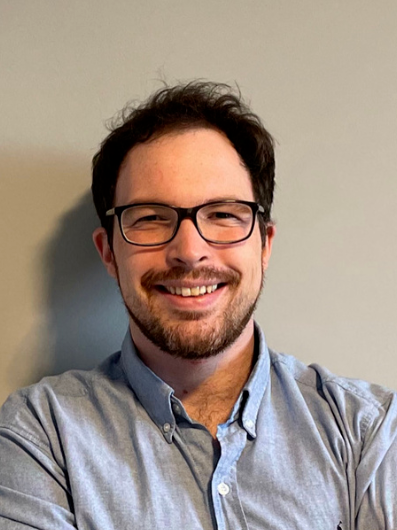 Bertrand de Franqueville
Bertrand de Franqueville
PhD Candidate, Kule Scholar
bertrand.defranqueville@uottawa.ca
Bertrand de Franqueville is a PhD Candidate in Political Science at the University of Ottawa and holder of the Kule doctoral scholarship. After having completed a master’s thesis about the process of engagement within the Azov Movement in Ukraine at the Université Paris 1 Panthéon-Sorbonne, he pursues his doctoral research on the distinctions between the extreme radical right and left movements in Ukraine and how their engagement has evolved since the Euromaidan revolution and the outbreak of war in 2014. His research interests include activism, political violence, nationalism, and armed engagement. Bertrand is coordinator of the Chair since 2024.
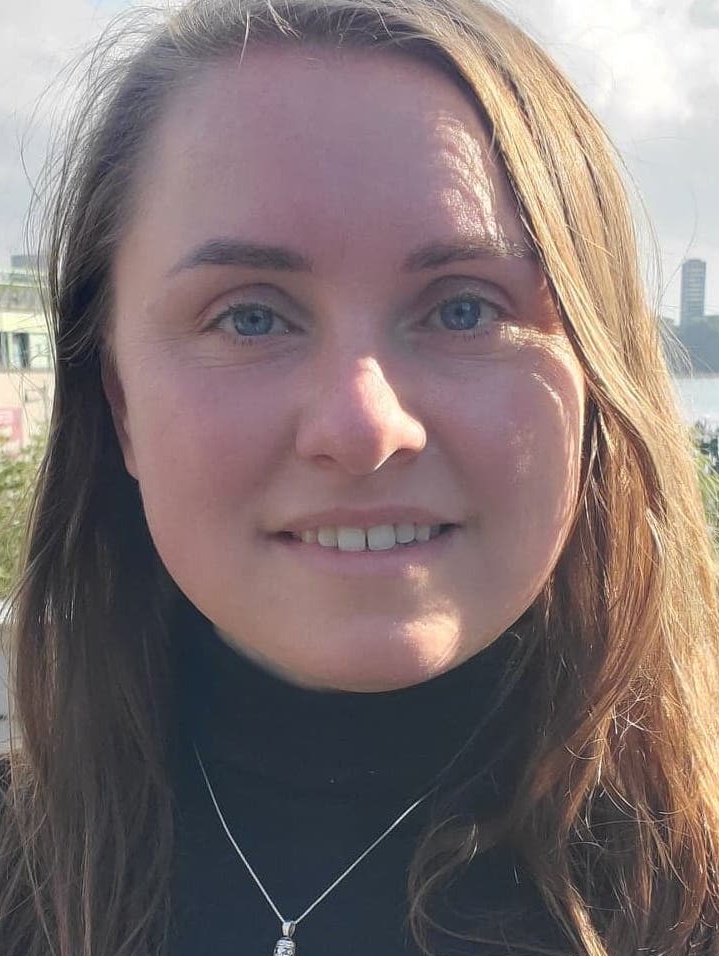 Klavdia Tatar
Klavdia Tatar
PhD Candidate, Ex-Kule Scholar
ktata092@uottawa.ca
Klavdia Tatar is a PhD Candidate in Political Science at the University of Ottawa and a former holder of the Kule Doctoral Scholarship. Her dissertation research focuses on the Ukrainian diaspora activism in Canada. More broadly, she has a strong interest in international and regional security (Ukraine and Russia), diaspora and immigration politics in Canada. Since 2019, she has taught various courses in Political science at the University of Ottawa. Klavdia currently is a Federal Public servant.
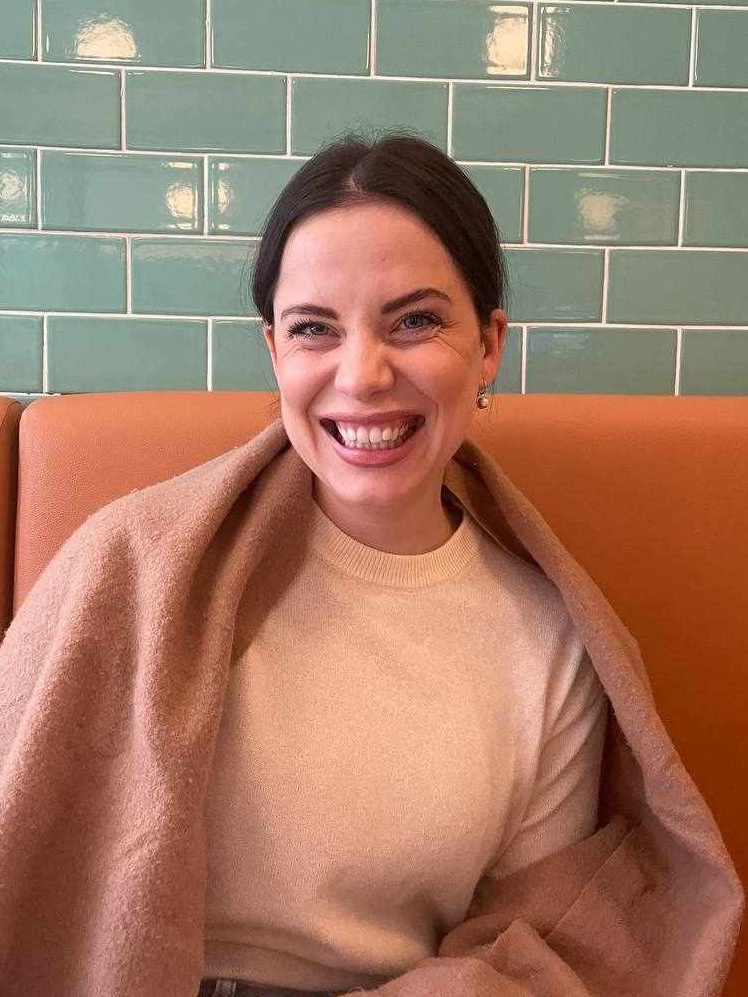 Ania Vozna
Ania Vozna
PhD Candidate, Kule Scholar
Ania works on language change in Ukraine eliciting Soviet legacies in language education and how educators from formal and non-formal educational environments work to reflect on, conceptualize, and overcome these legacies and how this affects what it means to be a legitimate Ukrainian speaker and a legitimate Ukrainian. Ania’s research builds on her background in sociolinguistics and language education.
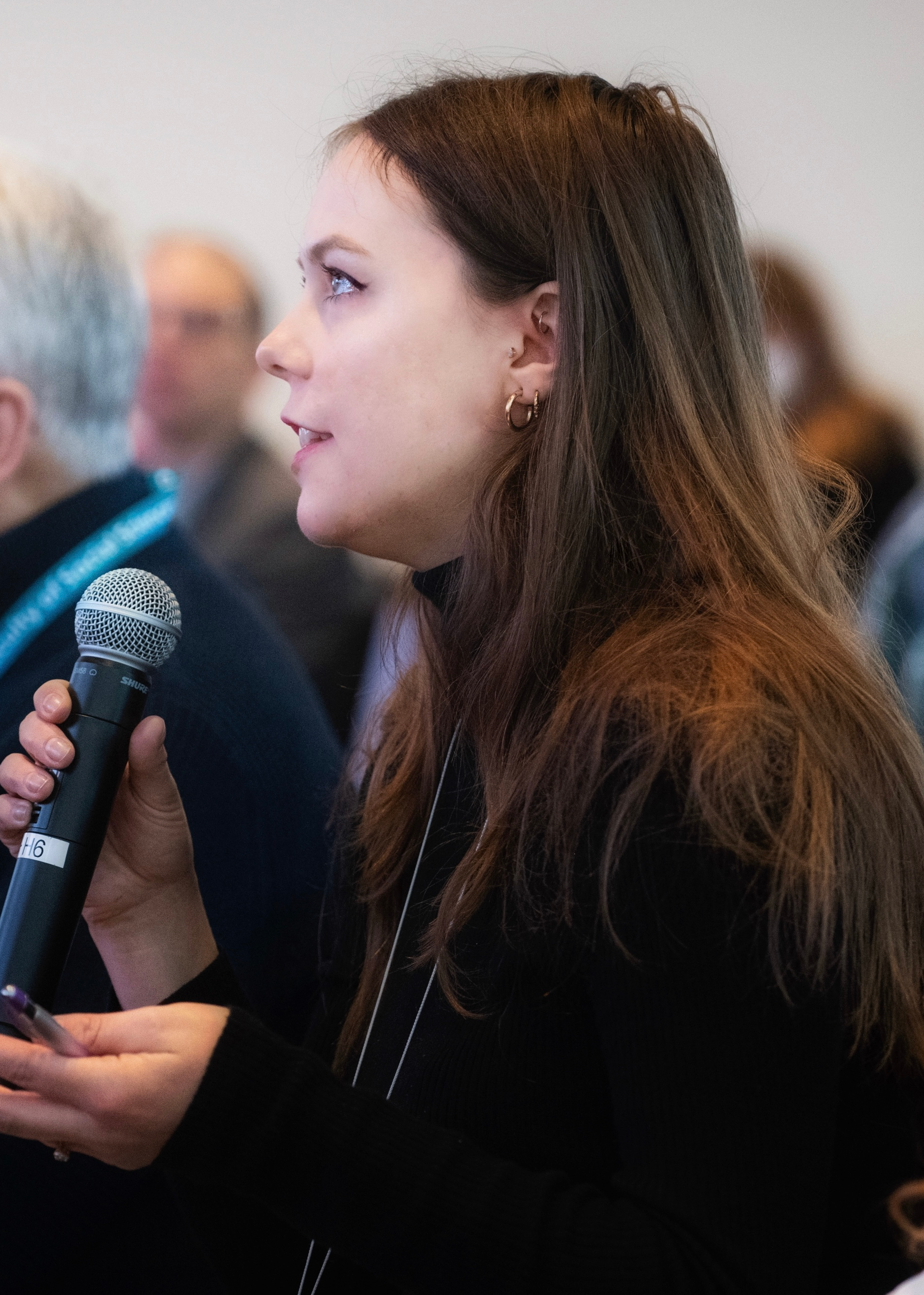 Alexandra Wishart
Alexandra Wishart
PhD Candidate, Kule Scholar
Alexandra Wishart is a PhD candidate in PolSci at the University of Ottawa, member of the Chair of Ukrainian Studies, and holder of the Kule doctoral scholarship. Her dissertation deals with cultural production and civic resistance during Ukraine’s full-scale invasion. Her research interests include Political Ethnography, Political Activism, and Transnationalism. Since 2020 she has worked as ASN Convention Assistant Director for the Association for the Studies of Nationalities (ASN) and the Harriman Institute.
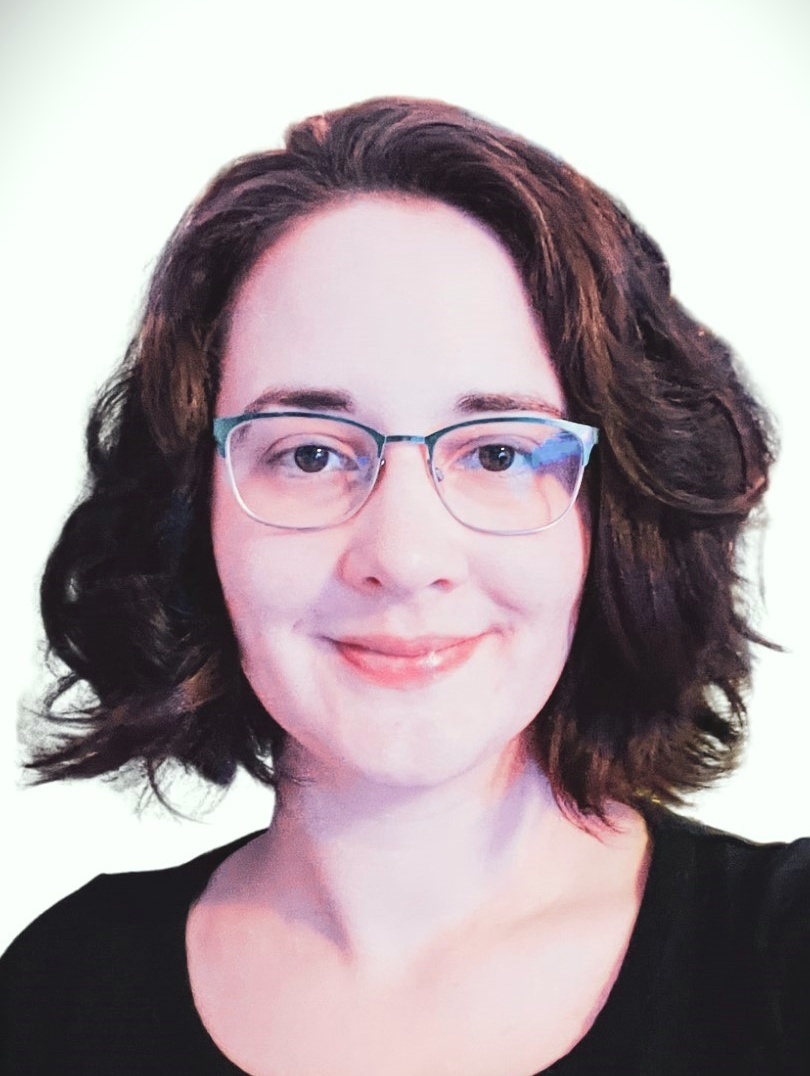 Anastasia Llewellyn
Anastasia Llewellyn
PhD Candidate, U of Ottawa
anastasia.llewellyn@uottawa.ca
Anastasia Llewellyn is working on a doctorate in Political science at the University of Ottawa, with a focus on language and territory, particularly in Wales. Her research, funded by the Social Sciences and Humanities Research Council of Canada, highlights the unintended consequences of policy choices on minoritized languages. She holds a master’s in translation studies from Concordia University in Montreal, where she also lectures in translation. Anastasia was Coordinator of the Chair from 2022-2024.
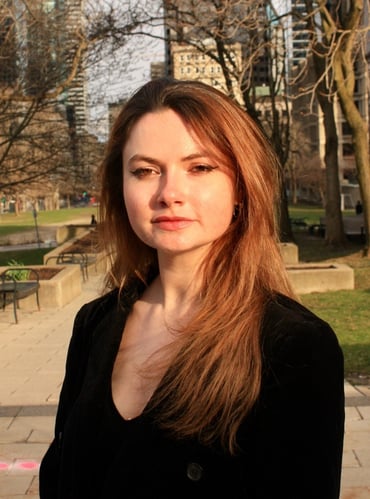 Lou Raisonnier
Lou Raisonnier
PhD Candidate, U of Ottawa
lou.raisonnier@uottawa.ca
Lou Raisonnier is writing a doctoral thesis on the treatment and legal shaping by French security and administrative institutions of the return of women involved in the Islamic State organization in the Iraqi/Syrian zone. She holds a bachelor's degree in political science and Islamic studies from McGill University and a master's degree in international security from the School of International Affairs at Sciences Po Paris.
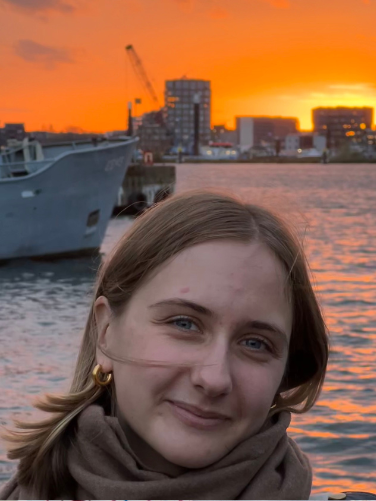
Dariya Akhova
Fellow
Dariya completed her master’s degree at the Munk School of Global Affairs and Public Policy, semester abroad at The Hertie School, and her bachelor’s degree at uOttawa in Political Science and Sociology, semester abroad at Sciences Po Paris. Dariya’s academic work focussed on the change in language ideology among Gen Z Ukrainians following Russia’s full-scale invasion. Dariya now works at Global Affairs Canada in the European bilateral division.
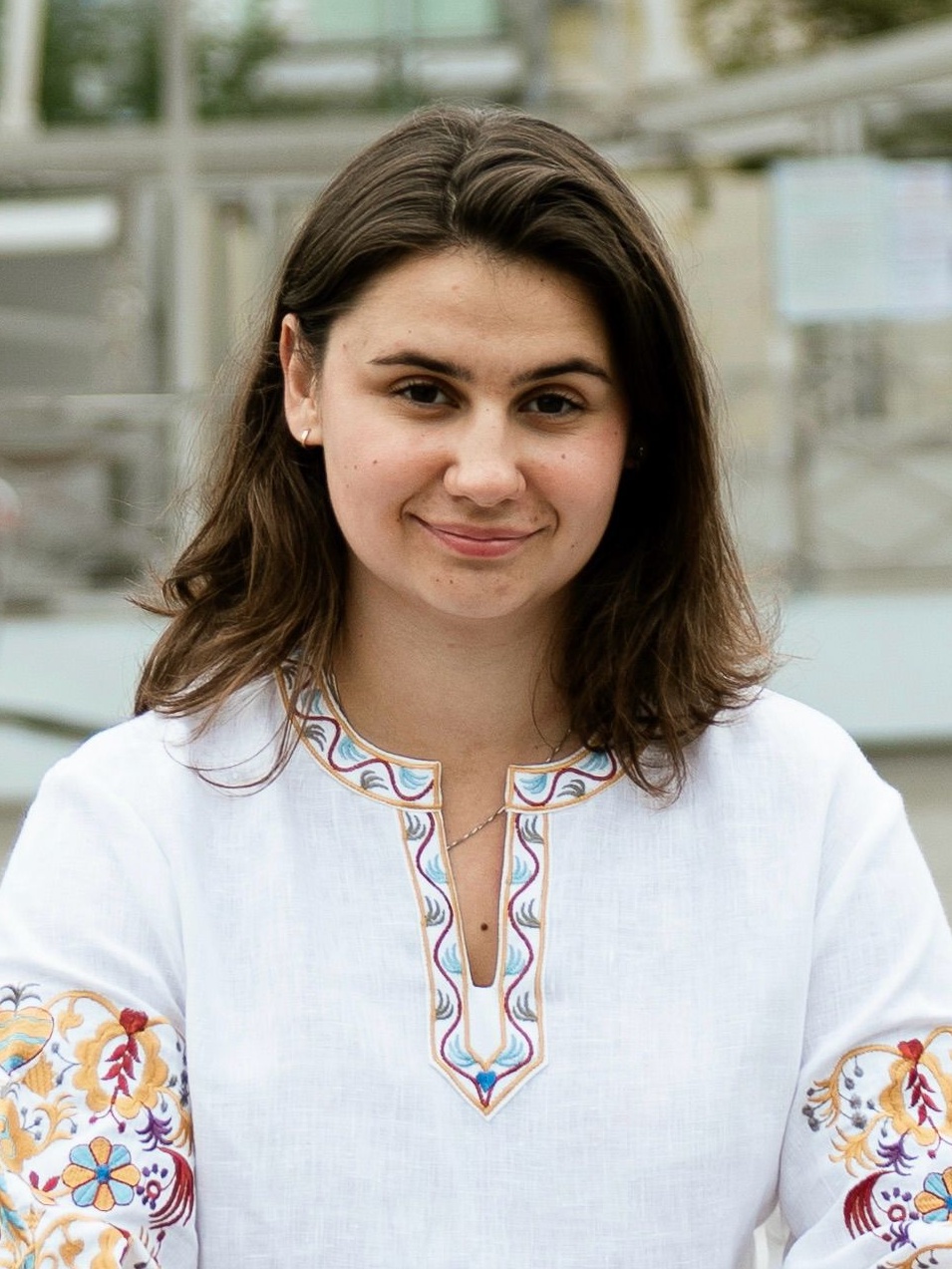 Katerina Sviderska
Katerina Sviderska
Fellow, U of Cambridge
Katerina Sviderska, born in Kherson, is a PhD candidate in Slavonic Studies at the University of Cambridge. She recently completed a master's degree in political science at the Université de Montréal, under the supervision of Magdalena Dembińska. Her research focuses on the construction of memory and identity in Ukraine since the full-scale invasion. More broadly, she is interested in issues related to nation-building, the politics of memory and the region of Eastern Europe and the South Caucasus.
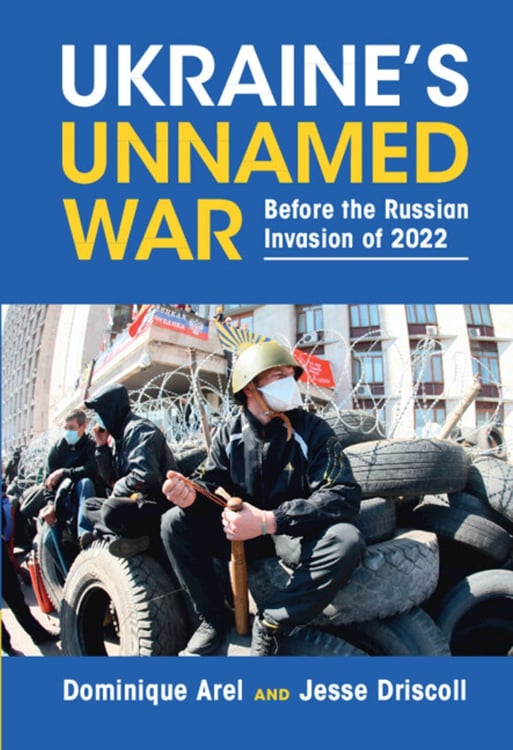
Spotlight: Ukraine's Unnamed War (Cambridge, 2023)
Dominique Arel, Jesse Driscoll
The Russian invasion of Ukraine in 2022 has its roots in the events of 2013–2014. Russia cynically termed the seditionist conflict in Crimea and Eastern Donbas a 'civil war' in order to claim non-involvement. This flies in the face of evidence, but the authors argue that the social science literature on civil wars can be used help understand why no political solution was found between 2015 and 2022. The book explains how Russia, after seizing Crimea, was reacting to events it could not control and sent troops only to areas of Ukraine where it knew it would face little resistance (Eastern Donbas). Kremlin decision-makers misunderstood the attachment of the Russian-speaking population to the Ukrainian state and also failed to anticipate that their intervention would transform Ukraine into a more cohesively 'Ukrainian' polity. Drawing on Ukrainian documentary sources, this concise book explains these important developments to a non-specialist readership.
Publications
Papers :
Akhova, Dariya. « Exploring the Contradiction: Russian-Speaking Ukrainian Nationalists », YPolitika, 2 September 2021. Online: https://www.ypolitika.com/post/exploring-the-contradiction-russian-speaking-ukrainian-nationalists
Fomitchova, Anastasia. « L’Ukraine en temps de guerre : Où en sont les réformes internes », in Anne de Tinguy (dir.), Regards sur l’Eurasie. L’année Politique 2023/Les Etudes du CERI, n°273-274, February 2024.
Fomitchova, Anastasia. « Les oligarques de l’Ukraine post-Maïdan : une imbrication des sphères politique et économique », Critique internationale, vol. 96, no. 3, 2022, pp. 127-149.
Fomitchova, Anastasia. « Comment Kyiv n’est pas tombée », AOC media, 5 May 2022. Online : https://aoc.media/analyse/2022/05/05/comment-kyiv-nest-pas-tombee/
Fomitchova, Anastasia. « Les volontaires dans la formation de l’appareil militaire ukrainien (2014-2018). Des dynamiques d’auto-organisation au retour de l’État », Revue d’études comparatives Est-Ouest, vol. 1, no. 1, 2021, pp. 137-170.
Fomitchova, Anastasia. « Russie-Ukraine : Anciens et nouveaux leviers du conflit », Diplomatie, July-August, 2019, Online : https://www.areion24.news/2019/11/25/russie-ukraine-anciens-et-nouveaux-leviers-du-conflit/?fbclid=IwAR1Z7dXepflxO7RkIEU4JZT3vbtoH5T2lJlWPtKtHCzBeWouYx0aN1k0YYc
Fomitchova, Anastasia. « Les victimes invisibles du conflit russo-ukrainien : les trafics d’êtres humains depuis 2014 », La lettre des droits de l’Homme en Europe orientale et dans l’espace post-soviétique, January-March 2019. Online : https://www.ldh-france.org/wp-content/uploads/2019/05/Lettre-31.pdf
Fomitchova, Anastasia. « Guerre du Donbass : le président ukrainien en quête de légitimité », AOC media, 4 November 2019. Online : https://aoc.media/analyse/2019/11/04/guerre-du-donbass-le-president-zelensky-en-quete-de-legitimite/
Franqueville (de), Bertrand, Nonjon, Adrien. « La gestion d’une mobilisation politique et militaire : réflexions sur les liens entre le mouvement Azov et l’État ukrainien (2014-2021) », The Journal of Power Institutions in Post-Soviet Societies, Issue 23, 2023. Online : https://journals.openedition.org/pipss/6414
Franqueville (de), Bertrand, Nonjon, Adrien. « Mémoire et sentiment national en Ukraine », La Vie des Idées, 17 May 2022. Online : https://laviedesidees.fr/Memoire-et-sentiment-national-en-Ukraine.html
Translated in Spanish in : « Sentimiento nacional y batallas por la memoria en Ucrania », NUSO, n°302, September-October 2022. Online: https://nuso.org/articulo/301-sentimiento-nacional-batallas-memoria-ucrania/
Llewellyn, Anastasia, Cardinal, Linda. 2022. “Best Practices and Language Policy Designs: Lessons from Canada and Wales,” in Wilson McLeod, Rob Dunbar, Kathryn Jones, and John Walsh (eds.), Language, Policy and Territory: A Festschrift for Colin H. Williams, Palgrave-MacMillan.
Llewellyn, Anastasia. 2019. “Quand les hymnes nationaux se traduisent en fraternité,” Circuit, Online: https://www.circuitmagazine.org/dossier-143/quand-les-hymnes-nationaux-se-traduisent-en-fraternite
Llewellyn, Anastasia. 2018. “Dyw un iaith byth yn ddigon – One Language Is Never Enough: Language Policy and Translation in Modern Wales,” in Gillian Lane-Mercier, Denise Merkle and Jane M. Koustas (eds.), Minority Languages, National Languages, and Official Language Policies, McGill-Queens University Press.
Sviderska, Katerina. 2023. ‘Le Féminisme En Politique Étrangère, Un Spectacle Symbolique?’ [Feminism in Foreign Policy : A Symbolic Spectacle?] Research Network on Women, Peace and Security (blog). 11 April 2023. Online: https://www.mcgill.ca/rnwps/article/our-blog/le-feminisme-en-politique-etrangere-un-spectacle-symbolique
Tatar, Klavdia, Nikolko, Milana. « Trauma Visualization: The Role of Transnational Actors in the Mnemonic Preservation and Promotion of Holodomor Narratives in Canada » in Dovilė Budrytė, Erica Resende and Doug Becker (Eds.), Defending Memory in Global Politics: Mnemonical In/Security and Crisis, Routledge Press. Forthcoming in July 2025.
Tatar, Klavdia. « Helping the Homeland in Troubled Times: Advocacy by Canada’s Ukrainian Diaspora in the Context of Regime Change and War in Ukraine.», Central and Eastern European Migration Review, 9, no. 2 (2020): 35–51.
Vozna, Ania (2021). Towards World Russians: How Ukrainian Russophones Construct Boundaries from the Russian Federation. Esamizadat: https://www.esamizdat.it/ojs/index.php/eS/article/view/123
Wishart, Alexandra. « Networks of Solidarity, Resistance and Anti-Imperial Struggle: The Case of Kyiv’s Techno Community », Revista Lüvo, August 2022. Online: https://fundacionluvo.org/?page_id=48
Wishart, Alexandra. « The Costs of Saving Europe’s asparagus harvest », New Eastern Europe, 7 September, 2020. Online: https://neweasterneurope.eu/2020/09/07/the-cost-of-saving-europes-asparagus-harvest/
Wishart, Alexandra. «Ukrainians in the Polish-German Borderland», New Eastern Europe/Solidarity Academy, 22 May, 2019. Online: https://neweasterneurope.eu/2019/05/22/ukrainians-in-the-polish-german-borderland/?fbclid=IwAR13RM7DK2E_2uYE-IUIQvAJffqe6-5DhgLxc2fuxg_HEGhQ2OzeRr_il-U
Wishart, Alexandra. « Ukrainian Civil Society Under Attack. », New Eastern Europe, 8 Novembre, 2018. Online: https://neweasterneurope.eu/2018/11/08/ukrainian-civil-society-attack/?fbclid=IwAR0dPMILcNmK0RK9n0JZLCZiEs-yAfjBfcrMsBhxOqWY1y21HYJXZnH8QlE
Wishart, Alexandra « How the Ukrainian far-right has become one of the biggest proponents of Intermarium.» New Eastern Europe/Daleko&Blisko, 25 September, 2018. Online: https://neweasterneurope.eu/2018/09/25/ukrainian-far-right-become-one-biggest-proponents-intermarium/
Reports:
Fomitchova, Anastasia. «Human trafficking and the war in eastern Ukraine: new schemes of forced labour and forced criminality» Cosmopolitan Project Foundation (in partnership with the Ukrainian Helsinki Human Rights Union & the Media Initiative for Human Rights).
Book Reviews:
Fomitchova, Anastasia. « Book review of Richard Youngs’ “Europe Eastern Crisis » (Cambridge University Press, 2016) »
Chroniques européennes - Revue Française de Science Politique vol. 64 n°4, September 2019.
Llewellyn, Anastasia. 2021. “Paradiplomatie identitaire : Nations minoritaires et politiques extérieures. Justin Massie et Marjolaine Lamontagne, 2019, Québec: Les Presses de l’Université du Québec, Pp. 229.” Canadian Journal of Political Science 54(2): 498–9. Cambridge University Press.
Sviderska, Katerina. (To be published). « Book review of “Varieties of Nationalism : Communities, Narratives, Identities” by Harris Mylonas & Maya Tudor », Politique et sociétés.
Tatar, Klavdia, « Strategic Friends: Canada-Ukraine Relations from Independence to the Euromaidan: By Bohdan S. Kordan, Montreal, McGill-Queen’s University Press, 2018, 176 Pp., Can$26.95 (Paperback), ISBN 978-0-773-55521-1. », Canadian Slavonic Papers. Routledge, 2019.
Vozna, Ania (2022). Review of the book Politics of the Russian Language beyond Russia by Christian Noack (Ed.). Ab Imperio: https://muse.jhu.edu/pub/178/article/864285
Vozna, Ania (2021). Review of the book Esperanto and Languages of Internationalism in Revolutionary Russia (New York; London: Bloomsbury, 2021) by Brigid O’Keeffe. Ab Imperio: https://www.abimperio.net/cgi-bin/aishow.pl?state=showa&idart=5128&idlang=1&Code=
Vozna, Ania (2020). Review of the book Ukrainian, Russophone, (Other) Russian. Hybrid Identities and Narratives in Post-Soviet Culture and Politics by M. Puleri. Ab Imperio: https://www.abimperio.net/cgi-bin/aishow.pl?state=showa&idart=4933&idlang=1&Code=
Medias
Op-Ed :
Akhova, Dariya, “Coming of Age in a Time of War”, Open Canada, 29 March 2022. Online: https://opencanada.org/coming-of-age-in-a-time-of-war/
Franqueville (de), Bertrand et Nonjon Adrien, « « L’extrême droite ukrainienne existe et elle est déjà bien documentée », La Croix, 21 March 2022. Online: https://www.la-croix.com/Debats/Lextreme-droite-ukrainienne-existe-deja-bien-documentee-2022-03-21-1201206132
Sviderska, Katerina. 2023. ‘10 ans de guerre en Ukraine : la liberté ou la mort’ [10 years of war in Ukraine : freedom or death]. La Presse. Online : https://www.lapresse.ca/dialogue/opinions/2024-02-21/deux-ans-de-guerre-en-ukraine/la-liberte-ou-la-mort.php.
Sviderska, Katerina. 2023. ‘Le Canada Doit Soutenir l’intégration de l’Ukraine Dans l’OTAN’ [Canada Must Support Ukraine’s NATO Integration]. Le Devoir, 11 July 2023. Online : https://www.ledevoir.com/opinion/idees/794365/idees-le-canada-doit-soutenir-l-integration-de-l-ukraine-dans-l-otan.
Sviderska, Katerina. 2023. ‘Canada Must Support Ukraine’s NATO Integration’. The Hill Times, 10 July 2023. Online : https://www.hilltimes.com/story/2023/07/10/canada-must-support-ukraines-nato-integration/392326/
Sviderska, Katerina. 2023. ‘Destruction Du Barrage de Kakhovka : Qui Ne Dit Mot Consent’ [Destruction of the Kakhova Dam : Who Says Nothing Agrees]. La Presse, 9 June 2023. Online : https://www.lapresse.ca/debats/opinions/2023-06-09/destruction-du-barrage-de-kakhovka/qui-ne-dit-mot-consent.php.
Sviderska, Katerina. 2023. ‘Ukraine : Entre Génocide et Natiocide’ [Ukraine : Between Genocide and Natiocide]. La Presse, 1 May 2023. Online : https://www.lapresse.ca/debats/opinions/2023-05-01/ukraine-entre-genocide-et-natiocide.php.
Sviderska, Katerina. 2023. ‘Les Enfants Ukrainiens, Trophées de Guerre Russes’ [Ukrainian Children : Russian War Trophies]. La Presse, 22 March 2023. Online : https://www.lapresse.ca/debats/opinions/2023-03-22/les-enfants-ukrainiens-trophees-de-guerre-russes.php.
Sviderska, Katerina. 2023. ‘The Womanly Face of the War in Ukraine’. The Toronto Star, 10 March 2023. Online : https://www.thestar.com/opinion/contributors/the-womanly-face-of-war-in-ukraine/article_51540f8a-acf8-569f-83cb-0f2267661c24.html
Sviderska, Katerina. 2023. ‘Manifestations En Géorgie : Il a Toujours Été Question de l’Europe’ [Protests in Georgia : It Has Always Been About Europe]. La Presse, 10 March 2023. Online : https://www.lapresse.ca/debats/opinions/2023-03-10/manifestations-en-georgie/il-a-toujours-ete-question-de-l-europe.php
Sviderska, Katerina. 2023. ‘La Guerre a Un Visage de Femme’ [The War Has A Womanly Face]. La Presse, 22 February 2023. Online: https://www.lapresse.ca/debats/opinions/2023-02-22/la-guerre-a-un-visage-de-femme.php.
Articles:
Wishart, Alexandra; Planert, Dario. 2019. “Five years later – the Occupation through the Lens of Young Crimean Tatars.” Hromadske Radio, 8 July, 2019. Online: https://hromadske.radio/en/podcasts/vlasna-dumka/five-years-later-the-occupation-through-the-lens-of-young-crimean-tatars
Interviews:
Interview with Dominique Arel and Anastasia Fomitchova : “La visite du président Zelensky au Canada’’ [President Zelensky’s visit to Canada]. Interviewed by Anne-Marie Dussault for 24/60, Radio-Canada Information. September 22, 2023. Online: https://x.com/AMarieDussault/status/1705375048801104073?s=20
Interview with Dominique Arel and Katerina Sviderska : “365 jours de la guerre en Ukraine’’ [365 Days of War in Ukraine]. Interviewed by Anne-Marie Dussault for 24/60, Radio-Canada Information. February 23, 2023. Online: https://ici.tou.tv/24-60-edition-speciale-365-jours-de-guerre-en-ukraine
Interview with Anastasia Fomitchova: « Guerre en Ukraine : « beaucoup de femmes ont choisi de rester et de s’engager » », Interview l’Express, 9 March 2022. Online : https://www.lexpress.fr/monde/guerre-en-ukraine-beaucoup-de-femmes-ont-choisi-de-rester-et-de-s-engager_2169447.html
Interview with Anastasia Fomitchova : « Armée russe, la fabrique de la violence », Interview France Culture, 9 January 2023. Online : https://www.radiofrance.fr/franceculture/podcasts/cultures-monde/russie-les-conscrits-dans-la-guerre-4267771
Interview with Anastasia Fomitchova : « Zelensky s’est lancé, face aux oligarques, dans un processus que l’on n’avait jamais observé auparavant dans l’histoire de l’Ukraine indépendante », Interview La Libre Belgique, 06 September 2023. Online : https://www.lalibre.be/international/europe/guerre-ukraine-russie/2023/09/06/guerre-en-ukraine-pour-les-oligarques-ukrainiens-les-pertes-se-soldent-en-milliards-de-dollars-X4AX5MJHCFBU3EVXS5IBK7DMCI/
Interview with Anastasia Fomitchova : « Les oligarques ukrainiens, victimes collatérales de la guerre », Interview Les Échos, 21 September 2023. Online : https://www.lesechos.fr/monde/europe/les-oligarques-ukrainiens-victimes-collaterales-de-la-guerre-2030301
Interview with Anastasia Llewellyn: The 2020 American election, by Jhade Montpetit, host of Les Malins on Radio-Canada Ottawa-Gatineau on November 7, 2020.
Interview with Katerina Sviderska : “La visite du président Zelensky au Canada’’ [President Zelensky’s Visit to Canada]. Interviewed by Patrice Roy for Téléjournal, Radio-Canada Information. September 22, 2023. Online: https://x.com/PatriceRoyTJ/status/1705354540294275256?s=20
Interview with Katerina Sviderska : “La visite du président Zelensky au Canada’’ [President Zelensky’s Visit to Canada]. Interviewed by Patrick Lagacé for the radio show Le Québec Maintenant, 98,5 FM. September 22, 2023. Online: https://www.985fm.ca/audio/580481/justice-internationale-et-l-ukraine-le-canada-peut-faire-sa-part
Interview with Katerina Sviderska : “Katerina Sviderska : living and studying the war” Curriculum (podcast). Online: https://open.spotify.com/episode/4wpwtvL2gVD3b8boFqEEfo?si=1262f4f3c3d84be3
Interview with Katerina Sviderska : “Kidnapping d’enfants ukrainiens’’ [Kidnapping of Ukrainian Children]. Interviewed by Patrick Lagacé for the radio show Le Québec Maintenant, 98,5 FM. March 23, 2023. Online: https://www.985fm.ca/audio/548016/vladimir-poutine-aurait-consenti-au-kidnapping-d-enfants-ukrainiens
Interview with Katerina Sviderska : “Violence sexuelle et viols des femmes en Ukraine” [Sexual Violence and Rapes of Women in Ukraine]. Interviewed by Patrick Lagacé for the radio show Le Québec Maintenant, 98,5 FM. February 23, 2023. Online: https://www.985fm.ca/audio/542541/c-est-la-torture-le-viol-et-beaucoup-de-violence-qui-attendent-les-femmes
Upcoming works and communications
Arel, Dominique. « Imagining Reintegration: Territorial Reunification of Crimea and Eastern Donbas ». With Jesse Driscoll. At ASN Convention, Columbia University, May 2024.
Franqueville (de), Bertrand. « Was the Azov Movement an Agent of the Ukrainian State or a Competing Force? ». At ASN Convention, Columbia University, May 2024.
Llewellyn, Anastasia. « Threat as Catalyst for Activism: Language and Nationalism in Wales». At ASN Convention, Columbia University, May 2024.
Raisonnier, Lou. «We didn’t want them back, now we do: the repatriation policies for French female jihadists». At ISA Conference, San Francisco, April 2024.
Raisonnier, Lou. «We didn’t want them back, now we do». At ASN Convention, Columbia University, May 2024.
Sviderska, Katerina. 2024. “Brothers or neo-nazis? Discursive legitimation of Russia’s genocide in Ukraine”. British Association for Slavic Studies Congress, April 5, 2024. Cambridge, United Kingdom.
Sviderska, Katerina. «Russia, Friend or Foe? Uneasy Memories of 19th Century Deportations in Abkhazia». With Magdalena Dembińska. At ASN Convention, Columbia University, May 2024.
Sviderska, Katerina. 2024. ‘Mass Myths to Mass Violence : historiography in Russia and genocide in Ukraine’. Tartu Conference on East European and Eurasian Studies. June 20th, 2024. Tartu, Estonia.
Tatar, Klavdia. «Diaspora Mobilization during Political Crisis:The Russian War in Ukraine and the Case of Ukrainian Diaspora in Canada». At ASN Convention, Columbia University, May 2024.
Vozna, Ania (n.d.). Linguistic purism in Ukraine during the full-scale war. Sociolinguistic Studies (Under Review).
Vozna, Ania (n.d.) Decolonial identities in Eastern Ukraine on the eve of the full-scale war. Nationalities Papers (Under Review).
Wishart, Alexandra. «The Role of Location and Gender in the Production of Solidarity: Kyiv’s Cultural Community at War». At ASN Convention, Columbia University, May 2024
Who we are
The Chair of Ukrainian Studies is a research unit associated with the Faculty of Social Sciences at the University of Ottawa. It is the only chair in Canada and outside of Ukraine dedicated specifically to the study of contemporary Ukraine or related topics dealing with politics, economy and sociology of Eastern European states and the Post-Soviet space. The Chair uses an interdisciplinary approach, bringing together faculty members, research fellows, and graduate students from different disciplines as well as community members to discuss the issues of interest.
Mission
The Chair of Ukrainian Studies pursues four main objectives:
- Creates a stimulating academic and research environment for faculty members, researchers and graduate students working on issues pertinent for contemporary Ukraine;
- Extensively supports and contributes to the development of Ukrainian studies in Canada and abroad;
- Promotes the dissemination and visibility of research from emerging Ukrainian scholars living in Ukraine or abroad;
- Stimulates an ongoing dialogue and cooperation between the academia and the Ukrainian community in Canada by organizing various events to share and discuss ideas.
History
With a tradition of Ukrainian studies dating back to the 1960's, the University of Ottawa has a long history of such studies in North America. In the 1980's, the two research study funds created by the Antin and Nadia Iwachniuk and the Constantine Bida funds were integrated and became the Ukrainian Studies and Research Endowments (USRE) at the University of Ottawa. Its successor, the Chair of Ukrainian Studies, was formally established at the University of Ottawa, within the Faculty of Social Sciences, on February 1993 and was launched on November 1995 with the Rt. Hon. Ramon J. Hnatyshyn, former Governor General of Canada, as Honorary Patron. Since 2003, Dominique Arel, associate professor at the School of Political Studies, is the titular of the Chair of Ukrainian Studies.
Since its launching, the Chair of Ukrainian Studies has organized a variety of events, academic conferences and public lectures which have been held at the University of Ottawa. Among the events organized, the Chair is particularly proud of the Annual Danyliw Research Seminar, which is made possible since 2005 by the commitment and support of the Wolodymyr George Danyliw Foundation, and of the Ivan Franko Memorial Annual Lecture, organised since 1985 and co-sponsored by the Ukrainian Canadian Professional and Business Association (UCPBA). In 2011, the Chair has been endowed by the Kule family foundation in order to create the annual Drs. Peter and Doris Kule Doctoral Scholarship on Contemporary Ukraine for a Canadian or international student with an interest in contemporary Ukraine pursuing doctoral studies in social science discipline at the University of Ottawa.
The Ukraine List - Newsletter
- The Ukraine List (UKL) #502, 03 November 2019
- The Ukraine List (UKL) #501, 23 October 2019
- The Ukraine List (UKL) #500, 25 June 2019
- The Ukraine List (UKL) #499, 18 June 2019
- The Ukraine List (UKL) #498, 10 June 2019
- The Ukraine List (UKL) #497, 3 June 2019
- The Ukraine List (UKL) #496, 23 May 2019
- The Ukraine List (UKL) #488, 6 October 2017
- The Ukraine List (UKL) #487, 27 July 2017
- The Ukraine List (UKL) #486, 6 July 2017
- The Ukraine List (UKL) #485, 27 June 2017
- The Ukraine List (UKL) #484, 20 June 2017
- The Ukraine List (UKL) #483, 13 June 2017
- The Ukraine List (UKL) #482, 6 June 2017
- The Ukraine List (UKL) #481, 30 May 2017
University of Ottawa Ukrainian Students' Club (OUSC)
The Chair of Ukrainian Studies at the University of Ottawa plays a key role in advancing understanding of Ukraine and its role in the world. Your support helps us to continue our educational and research mission, to enrich knowledge about Ukraine, and to contribute to a more informed and peaceful worldview.
Every donation, no matter the size, makes a significant impact. It supports vital research, student and researcher scholarships, and promotes educational and cultural initiatives that enlighten and engage our community and beyond.
We invite you to join us in this important endeavor by donating to the Chair of Ukrainian Studies. Together, we can make a difference. Click here.






.png?width=1200&length=1200&name=ASN%20(1).png)
.png?width=1200&length=1200&name=CERIUM%20(1).png)
.png?width=1200&length=1200&name=%E2%80%9C%20(1).png)
.png?width=1200&length=1200&name=Copy%20of%20%E2%80%9C%20(2).png)
.png?width=1200&length=1200&name=0923%20-%20Adrien%20et%20Bertrand%20(eng).png)
.png?width=1200&length=1200&name=O822%20-%20Alexandra%20-%20Networks%20of%20Solidarity%20(eng).png)